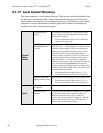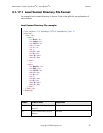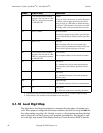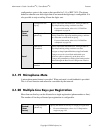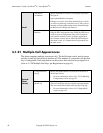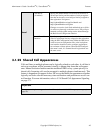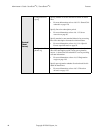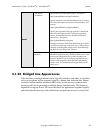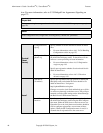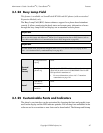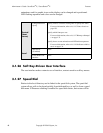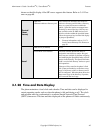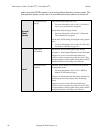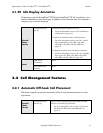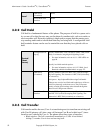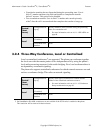
Administrator’s Guide - SoundPoint
®
IP / SoundStation
®
IP Features
46 Copyright © 2006 Polycom, Inc.
tion. For more information, refer to 5.2.5 Bridged Line Appearance Signaling on
page 172.
Important
Emergency routing is not supported on shared lines (refer to 4.6.1.2.2.2 Emergency <emergency/> on
page 95).
Note
In the configuration files, bridged lines are configured by “shared line” parameters.
Central
(boot
server)
Configuration file:
sip.cfg
Specify whether diversion should be disabled on shared
lines.
• For more information, refer to 4.6.1.12 Call Handling
Configuration <call/> on page 125.
Configuration file:
phone1.cfg
Specify per-registration line type (private or shared) and
the shared line third party name. A shared line will sub-
scribe to a server providing call state information.
• For more information, refer to 4.6.2.1 Registration
<reg/> on page 149.
Specify per-registration whether diversion should be dis-
abled on shared lines.
• For more information, refer to 4.6.2.3 Diversion
<divert/> on page 154.
Local
Web Server
(if enabled)
Specify per-registration line type (private or shared) and
third party name, and whether diversion should be dis-
abled on shared lines. Navigate to:
http://<phoneIPAddress>/reg.htm
Changes are saved to local flash and backed up to <Ether-
net address>-phone.cfg on the boot server. They will per-
manently override global settings unless deleted through
the Reset Local Confide menu selection.
Local Phone User
Interface
Specify per-registration line type (private or shared) and
the shared line third party name using the SIP Configura-
tion menu. Either the Web Server or the boot server con-
figuration files or the local phone user interface should be
used to configure registrations, not a mixture of these
options. When the SIP Configuration menu is used, it is
assumed that all registrations use the same server.



